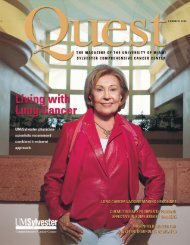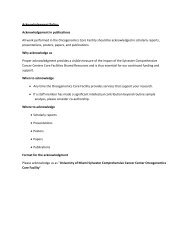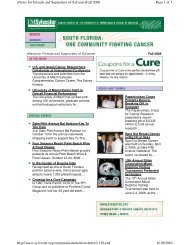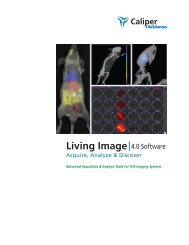SCIENTIFIC REPORT 2004 - Sylvester Comprehensive Cancer Center
SCIENTIFIC REPORT 2004 - Sylvester Comprehensive Cancer Center
SCIENTIFIC REPORT 2004 - Sylvester Comprehensive Cancer Center
Create successful ePaper yourself
Turn your PDF publications into a flip-book with our unique Google optimized e-Paper software.
C A N C E R P R E V E N T I O N A N D C O N T R O L P R O G R A M<br />
SELECTED PUBLICATIONS<br />
2002<br />
Antoni, MH, Cruess, DG, Klimas, N, Maher, K,<br />
Cruess, S, Kumar, M, Lutgendorf, S, Ironson, G,<br />
Schneiderman, N, and Fletcher, MA. Stress management<br />
and immune system reconstitution in<br />
symptomatic HIV-infected gay men over time:<br />
effects on transitional naive T cells<br />
(CD4(+)CD45RA(+)CD29(+)). American Journal<br />
of Psychiatry 159:143-5, 2002.<br />
Ironson, G, Solomon, GF, Balbin, EG,<br />
O’Cleirigh, C, George, A, Kumar, M, Larson, D,<br />
and Woods, TE. The Ironson-Woods Spirituality/<br />
Religiousness Index is associated with long survival,<br />
health behaviors, less distress, and low cortisol<br />
in people with HIV/AIDS. Annals of<br />
Behavioral Medicine 24:34-48, 2002.<br />
Kumar, M, Kumar, AM, Waldrop, D, Antoni,<br />
MH, Schneiderman, N, and Eisdorfer, C.<br />
The HPA axis in HIV-1 infection. Journal of<br />
Acquired Immune Deficiency Syndromes 31<br />
Supplement 2:S89-93, 2002<br />
2003<br />
Mitchell, A and Kumar, M. Psychological coping<br />
and cancer. Search strategy used is inadequate.<br />
British Medical Journal 326:598; author reply<br />
598, 2003.<br />
HIGHLIGHTS/DISCOVERIES<br />
• Made available urinary, blood, and salivary cortisol<br />
measurements that help in the understanding<br />
of the acute and more enduring effects of<br />
this form of stress management on different<br />
cancer populations studied at UM/<strong>Sylvester</strong>.<br />
• Installed a real time polymerase chain reaction<br />
(PCR) facility, which has been used to quantify<br />
viral loads for HPV 16 and 18 sub-strains in<br />
HIV+ women at-risk for cervical neoplasia in<br />
one CPOR project. In fact, viral loads samples<br />
have been obtained from the participants.<br />
SUZANNE C. LECHNER, PH.D.<br />
Assistant Professor of Psychiatry and<br />
Behavioral Sciences<br />
DESCRIPTION OF RESEARCH<br />
Dr. Lechner’s research in psycho-oncology<br />
focuses on two different themes: positive<br />
adaptation to breast cancer and the causes of late<br />
presentation to clinic following the detection of a<br />
breast cancer symptom. With regard to the first,<br />
Dr. Lechner is involved in clinical trials and correlational<br />
research studies to examine how people<br />
adjust to illness, and whether there are variables<br />
that can predict which patients will adapt well<br />
and which will require psychotherapeutic intervention.<br />
Within the context of all of these studies,<br />
she is interested in the complex relationships<br />
between positive adjustment and psychosocial<br />
and immunological/endocrine variables. The<br />
laboratory’s ongoing clinical intervention studies<br />
are examining the effects of a ten-week cognitivebehavioral<br />
stress management (CBSM) intervention<br />
versus a one-day stress management seminar<br />
on immunological, endocrine, and psychological<br />
outcomes for women with early stage breast cancer.<br />
In addition, Dr. Lechner is the primary investigator<br />
of another ongoing correlational research<br />
study, funded by the American Psychological Association<br />
Division 38, which will examine the<br />
correlates and consequences of benefit-finding<br />
(i.e., the belief that having cancer has led to positive<br />
life changes, such as better relationships with<br />
family and friends, a stronger sense of self-efficacy,<br />
and personal strength and redirected<br />
priorities).<br />
Dr. Lechner’s research also focuses on another<br />
topic: delayed presentation to clinic following<br />
the detection of a breast cancer symptom.<br />
Early detection and treatment has been shown to<br />
result in a significant reduction in breast cancer<br />
mortality. In spite of the importance of early detection,<br />
some women delay seeking consultation<br />
after they detect a suspicious breast cancer symp-<br />
20<br />
UM/<strong>Sylvester</strong> <strong>Comprehensive</strong> <strong>Cancer</strong> <strong>Center</strong> Scientific Report <strong>2004</strong>
















